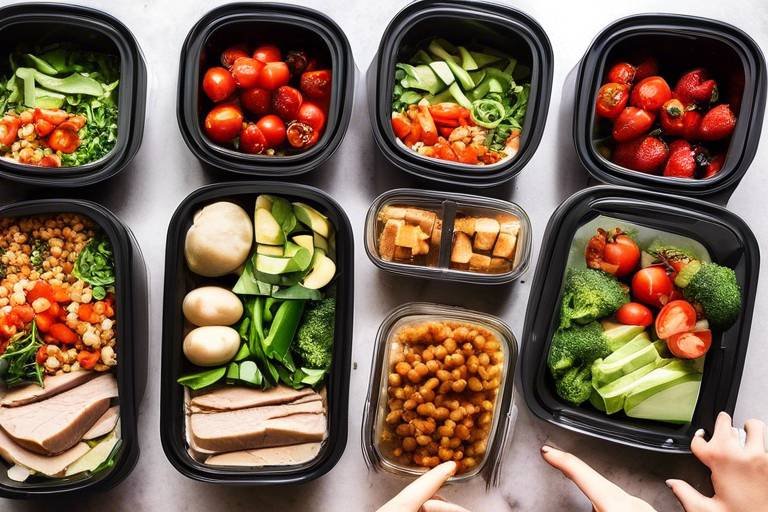Giving Back: The Benefits of Family Volunteering
Family volunteering is more than just an act of kindness; it’s a journey that brings families closer together while making a significant impact on the community. In a world where everyone seems to be rushing around, taking the time to volunteer as a family can create a beautiful pause, allowing you to connect with each other and the world around you. Imagine the joy of working side by side, tackling challenges, and celebrating victories together. This article delves into the numerous advantages of family volunteering, highlighting how it fosters stronger bonds, teaches valuable life skills, and positively impacts communities while enriching the lives of both parents and children.
When families volunteer together, they embark on shared experiences that can significantly strengthen their relationships. Volunteering is like a glue that holds families together, fostering communication and teamwork. Picture this: you and your family are at a local food bank, sorting donations. As you work together, you engage in conversations, share laughs, and even face challenges. These moments create a deeper understanding of one another's values and perspectives, ultimately leading to stronger family ties. It’s in these shared experiences that families can truly appreciate each other’s strengths and weaknesses, building a foundation of trust and love.
Family volunteering is a golden opportunity for children to learn essential life skills that will benefit them throughout their lives. From leadership and teamwork to empathy and responsibility, these experiences contribute to their personal development and growth. Think about it: when your child helps organize a community clean-up, they’re not just picking up trash; they’re learning to lead, to work with others, and to take responsibility for their environment. Each volunteer activity is a mini classroom, teaching valuable lessons in a hands-on way that traditional education often cannot provide.
Participating in volunteer activities allows children to connect with diverse communities, fostering a sense of empathy. Imagine your child serving meals at a homeless shelter; they’re not just feeding people; they’re learning about the challenges others face. This understanding helps them appreciate the struggles of others, promoting a sense of compassion and social responsibility. It opens their eyes to the world beyond their own experiences, shaping them into more considerate and caring individuals.
Through volunteering, families gain invaluable insight into local issues and needs. This heightened awareness encourages children to become active, informed citizens who care about their community and its well-being. When families engage in community service, they learn about the challenges their neighbors face, whether it’s food insecurity, environmental issues, or educational disparities. This knowledge empowers them to take action and advocate for change, making them more responsible and engaged members of society.
Volunteering often involves overcoming challenges, which enhances problem-solving skills. Families learn to work together to find solutions, fostering creativity and resilience in the face of obstacles. For instance, if a family is organizing a charity event and things don’t go as planned, they must brainstorm and adapt to the situation. This process not only strengthens their bond but also equips them with the skills to tackle future challenges, both as a family and as individuals.
Family volunteering promotes open communication, as members discuss their experiences and feelings. This dialogue strengthens connections and helps family members express themselves more effectively. After a day of volunteering, families can sit down and share their thoughts, reflections, and emotions. This kind of communication nurtures an environment where everyone feels heard and valued, paving the way for healthier relationships.
Engaging in volunteer work creates cherished memories that families can look back on fondly. These shared experiences foster a sense of unity and belonging, reinforcing family ties. Whether it’s a fun day planting trees in the park or a heartfelt evening serving meals, these moments become stories that families tell for years to come. They are the little snippets of life that bind families together, creating a tapestry of shared memories.
Volunteering can be a fun and enjoyable experience for families. Engaging in activities together not only helps the community but also allows families to bond and create joyful memories. Think of it as a family adventure where everyone plays a role. From painting a community center to organizing a charity run, these activities can be filled with laughter and joy, making the act of giving back a delightful experience.
Recognizing and celebrating the impact of their volunteer efforts reinforces a sense of accomplishment. Families can reflect on their contributions and appreciate the positive changes they made together. Whether it’s a simple “thank you” from someone they’ve helped or the sight of a cleaner park, these moments of recognition can be incredibly rewarding, motivating families to continue their journey of giving back.
- What types of volunteer opportunities are suitable for families?
Families can participate in various activities such as community clean-ups, food drives, animal shelters, and local charities. - How can volunteering benefit my child?
Volunteering teaches children valuable skills, builds empathy, and fosters a sense of responsibility and community awareness. - Is volunteering time-consuming?
Not necessarily! Families can choose opportunities that fit their schedules, whether it's a one-time event or a regular commitment. - How can we find local volunteering opportunities?
Check community boards, local non-profits, or websites dedicated to volunteering in your area.

Strengthening Family Bonds
This article explores the numerous advantages of family volunteering, highlighting how it fosters stronger bonds, teaches valuable life skills, and positively impacts communities while enriching the lives of both parents and children.
Volunteering together creates shared experiences that can significantly strengthen family relationships. Imagine spending a Saturday morning serving meals at a local shelter or planting trees in a community park. These activities are not just about giving back; they are about building connections and creating memories that last a lifetime. When families engage in meaningful activities, they foster communication, teamwork, and a deeper understanding of one another's values and perspectives.
During these volunteer experiences, family members often find themselves in situations that require them to collaborate and support one another. This teamwork can lead to open conversations about personal values, beliefs, and aspirations. For instance, a child might learn the importance of helping others by witnessing their parent's dedication to a cause, while parents can gain insight into their child's thoughts and feelings about social issues. Such interactions are invaluable, as they help to create an environment of trust and respect within the family unit.
Moreover, volunteering can serve as a platform for families to tackle challenges together. Whether it's organizing a charity event or participating in a community clean-up, these tasks often come with obstacles that require creative problem-solving. Families learn to communicate effectively, brainstorm solutions, and support each other through the ups and downs of the volunteering experience. This not only enhances their ability to work together but also strengthens their emotional bonds, as they celebrate successes and navigate difficulties as a unit.
Additionally, volunteering offers families the chance to meet and interact with other like-minded individuals and families. This can lead to the formation of new friendships and connections, further enriching their social circle. As families share their experiences with others, they cultivate a sense of community and belonging that extends beyond their immediate relationships. In essence, volunteering is not just about helping others; it’s about creating a network of support that benefits everyone involved.
In conclusion, family volunteering is a powerful way to strengthen bonds. It provides opportunities for shared experiences, fosters open communication, and encourages teamwork. As families work together to make a difference, they not only contribute to their communities but also create a strong, supportive foundation that will last for years to come.
- What types of volunteering activities are suitable for families? There are many activities, including community clean-ups, food drives, and animal shelters. Choose something that aligns with your family's interests.
- How can volunteering benefit my child's development? Volunteering teaches children essential life skills, such as empathy, teamwork, and problem-solving.
- Can volunteering help improve family relationships? Absolutely! Shared experiences during volunteering can foster communication and strengthen emotional bonds.
- How often should families volunteer together? The frequency can vary. Whether it's once a month or during special occasions, what's important is the quality of the experience.

Teaching Life Skills
Family volunteering is not just about giving back to the community; it’s a treasure trove of learning opportunities for children. When families come together to volunteer, they step into a world filled with experiences that teach essential life skills. Imagine your child, once shy and hesitant, blossoming into a confident leader as they take charge of a community project. This transformation doesn’t happen overnight, but through consistent involvement in meaningful activities, children learn invaluable lessons that will serve them throughout their lives.
One of the most significant skills gained through family volunteering is leadership. Children learn to take initiative and guide their peers, whether it’s organizing a food drive or leading a cleanup effort in a local park. They begin to understand what it means to motivate others and how to communicate their ideas effectively. This experience can be likened to planting seeds; with the right nurturing, those seeds grow into strong, capable leaders.
Moreover, volunteering fosters teamwork. When families work side by side, they learn the importance of collaboration. They discover that each member brings unique strengths to the table, and together they can achieve more than they could individually. This teamwork can be likened to a well-orchestrated symphony, where each instrument plays a vital role in creating beautiful music. Children learn to appreciate the value of different perspectives, enhancing their ability to work harmoniously with others.
Another critical aspect of volunteering is the development of empathy. When families engage with diverse communities, children gain insights into the lives of others. They learn to recognize and appreciate the challenges faced by different individuals, which fosters compassion and a sense of social responsibility. It’s like looking through a window into another world; suddenly, they see beyond their own experiences, understanding that everyone has their own story and struggles.
Additionally, volunteering provides a unique platform for teaching responsibility. Children learn that their actions can have a positive impact on the world around them. Whether it’s committing to a regular volunteering schedule or taking care of supplies during an event, these responsibilities help instill a sense of accountability. They learn that their contributions matter, which can boost their self-esteem and motivate them to take on more significant challenges in the future.
In essence, family volunteering is a dynamic way to equip children with essential life skills. As they engage in these experiences, they not only learn about leadership, teamwork, empathy, and responsibility but also develop a sense of purpose and belonging. It’s a win-win situation: families grow closer together while nurturing the next generation of compassionate, responsible citizens.
- What types of volunteering can families do together? Families can participate in various activities, such as community cleanups, food drives, tutoring, or helping at local shelters.
- How often should we volunteer as a family? The frequency can vary; however, regular involvement, such as once a month, can help establish a routine and deepen the impact.
- Are there age restrictions for children volunteering? Many organizations welcome children of all ages, but some may have specific age requirements, so it’s best to check beforehand.
- How can we find volunteering opportunities in our area? Websites like VolunteerMatch, local community centers, and social media groups are great resources for finding opportunities.
- What should we expect from our first volunteering experience? Expect to learn and grow together as a family, encountering challenges and joys that will strengthen your bonds.

Building Empathy
Have you ever noticed how volunteering can open your eyes to the world around you? When families engage in volunteer activities, they don’t just help others; they create a bridge to understanding diverse communities. This connection is vital in building empathy—the ability to understand and share the feelings of another. Imagine walking in someone else's shoes, feeling their struggles and joys. It’s a powerful experience that can transform how children view the world.
When children participate in community service, they are often exposed to different backgrounds and life situations. For instance, helping out at a local food bank or participating in a neighborhood cleanup allows them to see firsthand the challenges some families face. This exposure is crucial because it helps children develop a sense of compassion and a desire to contribute positively to society. They learn that everyone has a story, and their experiences may not be the same as their own.
Moreover, volunteering together as a family not only strengthens bonds but also encourages discussions about these experiences. After a day spent helping others, families can sit down and share their feelings about what they witnessed. Questions like “How did that make you feel?” or “What do you think we can do to help more?” can spark meaningful conversations that deepen understanding and empathy.
To illustrate the impact of volunteering on empathy, consider the following table that summarizes the benefits:
| Volunteer Activity | Empathy Development |
|---|---|
| Food Bank Assistance | Understanding food insecurity and its impact on families |
| Animal Shelter Support | Learning about animal welfare and compassion towards all living beings |
| Community Garden Projects | Appreciating the importance of fresh produce and teamwork |
In essence, volunteering acts as a catalyst for empathy, allowing children to connect with people from various walks of life. They learn to appreciate differences and recognize the common humanity that binds us all. This understanding doesn’t just stay within the confines of volunteering; it spills over into their everyday interactions, shaping them into more compassionate individuals who are aware of the world beyond their immediate surroundings.
So, the next time you consider family activities, think about how volunteering can enrich your family’s life. Not only will you be giving back to the community, but you’ll also be nurturing a generation that values empathy and understanding. It’s a win-win situation that benefits everyone involved.
- What types of volunteering are suitable for families?
Families can engage in various activities such as community cleanups, food drives, animal shelters, and mentoring programs. - How can volunteering help my child develop empathy?
By exposing children to different life situations and encouraging discussions about their experiences, volunteering helps them understand and share the feelings of others. - Can volunteering strengthen family bonds?
Yes! Working together towards a common goal fosters teamwork and communication, enhancing family relationships.

Community Awareness
When families engage in volunteering, they don't just lend a helping hand; they also open their eyes to the realities of their community. This experience is like a window into the lives of others, offering a fresh perspective on local issues and needs. Imagine walking through your neighborhood, noticing the vibrant community spirit, yet also seeing the challenges that some families face. Volunteering allows you to step outside your own bubble and truly understand what makes your community tick.
Through various volunteer activities, families can tackle issues like hunger, homelessness, and environmental concerns. For instance, participating in a local food drive not only helps distribute food to those in need but also highlights the importance of food security in your area. This kind of direct involvement fosters a sense of responsibility and encourages children to think critically about the world around them. They begin to ask questions like, “Why do some people struggle to find meals?” or “What can we do to help improve our community?”
Moreover, volunteering teaches families about the diversity within their community. Engaging with people from different backgrounds and cultures enriches the family's understanding of societal dynamics. It’s one thing to learn about diversity in school; it’s another to experience it firsthand. Families may find themselves participating in community clean-up days, cultural festivals, or assisting at shelters, all of which provide invaluable lessons in empathy and understanding.
The ripple effect of this heightened community awareness is profound. As families become more aware of local issues, they often feel compelled to take action beyond volunteering. They might start discussions at home about ways to advocate for change, participate in local government meetings, or even launch initiatives that address specific community needs. This proactive approach not only benefits the family but also contributes positively to the community as a whole.
In essence, volunteering serves as a powerful catalyst for community awareness. It transforms families from passive observers to active participants in their neighborhoods. By working together towards a common goal, families not only strengthen their bonds but also cultivate a deeper appreciation for their community and its diverse tapestry. This awareness is crucial for raising informed, compassionate citizens who are ready to make a difference.
- What types of volunteer activities are best for families?
Family-friendly activities include food drives, park clean-ups, community gardening, and assisting at local shelters. Choose activities that match your family's interests and abilities. - How can volunteering benefit my children?
Volunteering teaches children important life skills such as empathy, teamwork, and problem-solving. It also fosters a sense of responsibility and community awareness. - Can volunteering improve family relationships?
Yes! Engaging in volunteer work together creates shared experiences that strengthen communication and family bonds. - How often should we volunteer as a family?
There’s no set rule! Find a frequency that works for your family’s schedule, whether it’s once a month, quarterly, or during special events.

Problem-Solving Skills
When families come together to volunteer, they often find themselves faced with unique challenges that require creative solutions. This collaborative problem-solving is not just about overcoming obstacles; it’s about building a toolkit of skills that can be applied in various aspects of life. Imagine a family working together at a local food bank. They might encounter a situation where there aren’t enough containers for the food they need to package. Instead of panicking, they brainstorm alternatives, perhaps using boxes or bags they brought from home. This not only resolves the immediate issue but also teaches children how to think critically and adaptively.
Moreover, volunteering often places families in situations where they must assess needs and prioritize tasks. For instance, if a family is participating in a community clean-up, they may need to decide which areas require the most attention. This kind of decision-making fosters a sense of responsibility and encourages children to weigh options thoughtfully. They learn that problem-solving is not just about finding quick fixes; it’s about understanding the bigger picture and making informed choices.
In addition to enhancing critical thinking, volunteering can also improve a family’s communication skills. When family members discuss their strategies for tackling a problem, they practice articulating their thoughts clearly and listening to others. This exchange of ideas can lead to deeper discussions about values and priorities, further enriching their relationships. As a result, families not only solve problems together but also strengthen their bonds through effective communication.
To illustrate the impact of volunteering on problem-solving skills, consider the following table that outlines key benefits:
| Benefit | Description |
|---|---|
| Critical Thinking | Families learn to evaluate situations and come up with effective solutions. |
| Adaptability | Volunteering teaches families to adjust their plans and strategies as challenges arise. |
| Teamwork | Working together fosters collaboration and the ability to rely on one another. |
| Communication | Families enhance their ability to express ideas and listen to each other. |
Ultimately, the problem-solving skills developed through family volunteering extend far beyond the immediate context of their volunteer work. These skills are invaluable in everyday life, whether it’s tackling homework, navigating social situations, or even addressing future career challenges. By engaging in volunteer activities, families are equipping themselves with the tools they need to face life’s obstacles head-on, together.
- What types of volunteer activities are best for families?
Family-friendly activities can include community clean-ups, food drives, or volunteering at local shelters. Choose activities that align with your family's interests. - How can volunteering benefit my child's development?
Volunteering teaches children essential life skills such as empathy, teamwork, and problem-solving, all of which contribute to their personal growth. - Can volunteering strengthen family relationships?
Absolutely! Shared experiences and challenges during volunteering can foster deeper connections and improve communication among family members. - How often should families volunteer together?
There's no set rule, but regular volunteering—whether monthly or quarterly—can create lasting memories and a strong family bond.

Enhancing Communication
Family volunteering is not just about giving back; it's a fantastic way to enhance communication among family members. When families engage in volunteer activities together, they create a unique environment that encourages open dialogue. Imagine this: you're sorting food at a local pantry, and amidst the laughter and shared tasks, you find yourself discussing not just the task at hand, but also your thoughts and feelings about it. This kind of interaction fosters a deeper understanding of each other's viewpoints and emotions.
Moreover, volunteering often involves teamwork, which naturally leads to discussions about roles and responsibilities. As family members navigate these tasks, they learn to express their ideas clearly and listen to others. This is crucial because effective communication is a skill that extends beyond volunteering; it seeps into everyday family life. When children see their parents discussing solutions to challenges, they are more likely to emulate that behavior in their own interactions.
To illustrate the impact of volunteering on communication, consider the following points:
- Active Listening: While volunteering, family members must listen to each other to coordinate their efforts. This practice of active listening can spill over into daily conversations, making family discussions more meaningful.
- Conflict Resolution: Working together can sometimes lead to disagreements. However, resolving these conflicts during volunteer work can teach valuable lessons about compromise and understanding.
- Sharing Stories: Each volunteer experience comes with its own set of stories. Sharing these narratives can help family members bond and understand each other on a deeper level.
In essence, the act of volunteering serves as a catalyst for improved communication. Families not only learn to express their thoughts and feelings but also develop a stronger sense of trust and connection. This enriched communication helps create a nurturing environment where everyone feels valued and understood. So, the next time you think about volunteering, remember that it’s not just about the service you provide; it's also about the conversations and connections that blossom along the way.
- What are some good volunteer activities for families? Family-friendly activities include food drives, park clean-ups, and helping at local shelters or community centers.
- How can volunteering benefit children? Volunteering teaches children essential life skills, including empathy, teamwork, and problem-solving.
- How often should families volunteer together? Families should aim to volunteer regularly, whether it's monthly or quarterly, to maintain the benefits of shared experiences.
- Can volunteering help with family communication? Yes! Volunteering creates opportunities for open dialogue and strengthens family bonds through shared experiences.

Creating Lasting Memories
Engaging in volunteer work as a family is not just about giving back; it's about that you and your loved ones will cherish for years to come. When families come together to volunteer, they share unique experiences that foster a sense of unity and belonging. Each event, whether it's serving meals at a local shelter or organizing a community cleanup, becomes a chapter in your family’s story, filled with laughter, learning, and sometimes even a little chaos!
Think about it: how often do you get the chance to step outside your routine and do something meaningful together? Volunteering offers that opportunity. It’s like a treasure chest of memories waiting to be opened. As you work side by side, you create inside jokes, recount funny mishaps, and celebrate small victories. These moments become the glue that holds your family together, creating a tapestry of shared experiences that you can reminisce about during family gatherings.
Moreover, the act of giving back often leads to unexpected surprises that can spark joy and laughter. For instance, while planting trees in a local park, you might find yourselves in a friendly competition to see who can plant the most saplings. Or, while sorting donations at a food bank, you might stumble upon a box of nostalgic snacks that trigger a wave of childhood memories. These unexpected moments are what make volunteering not just rewarding, but also immensely fun.
Let’s not forget the importance of celebrating your achievements together! After a day of volunteering, take a moment to reflect on what you accomplished as a family. You might create a simple table to showcase your contributions, like this:
| Activity | Impact | Family Members Involved |
|---|---|---|
| Food Drive | Collected 200 cans of food | 4 |
| Community Clean-Up | Cleared 5 parks | 5 |
| Animal Shelter | Walked 10 dogs | 3 |
By acknowledging your efforts, you reinforce a sense of accomplishment. It’s not just about the hours spent volunteering; it’s about the impact you’ve made together. This reflection can lead to deeper discussions about your values and priorities as a family, helping everyone to appreciate the importance of community service.
In essence, family volunteering is like planting seeds of love and compassion that grow into beautiful memories. So, whether you're painting a mural in a community center or helping out at a local charity event, remember that the real treasure lies in the moments you create together. These experiences will not only enrich your lives but will also serve as a foundation for future generations to build upon. So go ahead, roll up your sleeves, and dive into the rewarding world of family volunteering!
- What age is appropriate for children to start volunteering?
Children can start volunteering as early as 5 or 6 years old, depending on the activity. It's important to choose age-appropriate tasks that they can handle safely. - How can we find volunteer opportunities in our community?
You can search online for local charities, community centers, or non-profit organizations. Websites like VolunteerMatch.org are great resources for finding opportunities that fit your family's interests. - What if my family has different interests?
It's okay to have varying interests! Try to find volunteer activities that combine everyone's passions or take turns choosing different projects to participate in as a family. - Can volunteering really make a difference?
Absolutely! Every little bit helps, and when families volunteer together, they not only impact their community but also inspire others to get involved.

Fun and Enjoyment
When you think about volunteering, what comes to mind? Perhaps images of hard work and sacrifice? Well, let me tell you, volunteering can be a blast! Families that volunteer together often find themselves laughing, bonding, and creating memories that last a lifetime. Imagine a Saturday spent planting flowers in a community garden. The sun is shining, the kids are giggling as they get their hands dirty, and the parents are sharing stories and jokes. It’s more than just work; it’s a chance to enjoy each other's company while making a difference.
One of the best parts about family volunteering is the variety of activities available. Whether it's organizing a food drive, helping at an animal shelter, or participating in a local clean-up day, there’s something for everyone. These activities not only serve the community but also allow families to explore their interests together. For instance, if your family loves animals, volunteering at a shelter can be both fulfilling and fun. You get to play with furry friends while teaching your children about compassion and responsibility.
Moreover, volunteering often leads to unexpected moments of joy. You might find yourselves laughing at a funny incident during a community event or celebrating a small victory when a project is completed. These moments create a sense of camaraderie that strengthens family ties. As you work together, you’ll find that the shared experience of helping others brings you closer. It’s like building a treasure chest of memories that you can look back on fondly for years to come.
And let’s not forget about the social aspect of volunteering. You’re not just working with your family; you’re meeting new people who share your values and interests. This can lead to new friendships and connections, enriching your family's social life. The joy of working alongside others can be contagious, making the experience even more enjoyable. Plus, who doesn’t love a good potluck after a day of hard work? Sharing a meal with fellow volunteers is an excellent way to celebrate your efforts and enjoy each other’s company.
In the end, volunteering as a family is about more than just giving back; it’s about creating a fun, enjoyable experience that brings you closer together. So, the next time you’re looking for a way to bond with your family, consider volunteering. You might just discover that the best memories are made when you’re working together for a common cause.
- What types of volunteering activities are suitable for families? There are many options, including community clean-ups, food drives, animal shelters, and local charities. Choose activities that align with your family’s interests.
- How can volunteering benefit my children? Volunteering teaches children valuable life skills, such as empathy, teamwork, and problem-solving, while also fostering a sense of community and responsibility.
- Can volunteering really be fun? Absolutely! Engaging in volunteer work creates opportunities for fun experiences, laughter, and shared memories that strengthen family bonds.

Celebrating Achievements
When families come together to volunteer, they often achieve remarkable things that deserve recognition. Celebrating these achievements can be a powerful way to reinforce the bonds formed during the volunteering experience. It’s like throwing a mini party for your heart and soul! Whether it’s helping at a local food bank, cleaning up a park, or organizing a charity event, reflecting on what you’ve accomplished as a family can be incredibly rewarding.
Imagine sitting around the dinner table, sharing stories about your volunteering adventures. You might reminisce about how you worked together to sort food donations, or how you painted a community center. Each story not only highlights your collective efforts but also brings to light the individual contributions that made a difference. This dialogue not only enhances your family’s connection but also fosters a sense of pride in what you’ve done together.
To make celebrating achievements even more special, consider creating a visual representation of your family’s volunteer journey. You could put together a scrapbook or a digital photo album that showcases the various activities you participated in. This could include:
- Photos of your family volunteering
- Quotes from family members about their experiences
- Certificates of appreciation or thank-you notes received from organizations
Creating this keepsake not only serves as a reminder of your collective impact but also allows you to reflect on the values you’ve instilled in your children through these experiences. Celebrating achievements can also involve setting goals for future volunteering efforts, creating a cycle of giving back that becomes a family tradition.
Furthermore, recognizing your family’s contributions can inspire others in your community. When you share your experiences on social media or within your local networks, you might encourage other families to join in the fun of volunteering. It’s like planting seeds of kindness that can grow into a garden of community spirit. So, gather around, celebrate your victories, and let your family’s achievements shine as a beacon of inspiration for others!
- What are the best activities for family volunteering? There are numerous activities such as food drives, animal shelters, park clean-ups, and tutoring programs that families can engage in together.
- How can volunteering impact children's development? Volunteering teaches children essential life skills such as empathy, teamwork, and problem-solving, which are invaluable for their personal growth.
- How often should families volunteer together? There’s no set rule! Families can volunteer as often as their schedules allow, whether it’s monthly, quarterly, or during special events.
- Can volunteering be fun for the whole family? Absolutely! Many volunteering activities are designed to be engaging and enjoyable, allowing families to bond while making a difference.
Frequently Asked Questions
- What are the benefits of family volunteering?
Family volunteering offers numerous benefits, including strengthening family bonds, teaching essential life skills, and creating lasting memories. It provides a platform for families to work together towards a common goal, fostering teamwork and communication.
- How does volunteering strengthen family relationships?
Volunteering together creates shared experiences that enhance communication and understanding among family members. These meaningful activities help families connect on a deeper level, leading to stronger relationships and a greater appreciation for each other's perspectives.
- What life skills can children learn through volunteering?
Children can learn a variety of life skills through family volunteering, such as leadership, teamwork, empathy, and responsibility. These experiences contribute to their personal growth, preparing them for future challenges and helping them develop into compassionate adults.
- How does volunteering promote empathy in children?
Participating in volunteer activities allows children to engage with diverse communities, helping them understand different perspectives and challenges faced by others. This exposure fosters empathy, compassion, and a sense of social responsibility.
- What kind of community awareness do families gain from volunteering?
Families gain valuable insights into local issues and needs through volunteering. This increased awareness encourages children to become active, informed citizens who care about their community's well-being and are motivated to contribute positively.
- How does family volunteering enhance problem-solving skills?
Volunteering often presents challenges that require families to work together to find solutions. This collaborative approach enhances problem-solving skills, fostering creativity and resilience as families learn to overcome obstacles together.
- Can family volunteering be a fun experience?
Absolutely! Family volunteering can be a fun and enjoyable experience. Engaging in activities together not only helps the community but also allows families to bond, laugh, and create joyful memories that they will cherish for years to come.
- How can families celebrate their volunteer achievements?
Families can celebrate their volunteer achievements by reflecting on the positive changes they've made together and recognizing each other's contributions. This acknowledgment reinforces a sense of accomplishment and unity within the family.



















